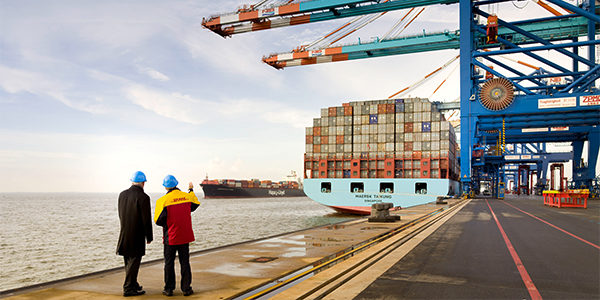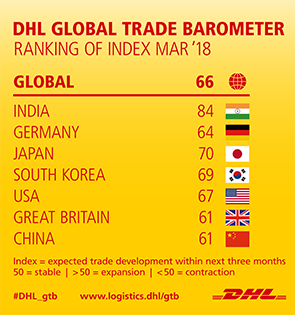DHL report shows strengthening of global trade during second quarter

A quarterly report on global trade patterns published today by transport and logistics giant DHL indicated a strengthening of activity in March over the last reading in January, DHL said.
The "DHL Global Trade Barometer" increased to 66 points in March from 64 points in January, when the index was published for the first time. With an index value well above the break-even mark of 50, the report is sending bullish signals about the current and future outlook for trade, DHL said.
All seven countries that comprise the trade activity showed increases over January, according to the report. The improvements over January are largely due to a more positive outlook for South Korean and U.S. trade. The two countries announced yesterday they had reached a bilateral trade accord to revise the agreement that was signed in 2012.
By contrast, the outlook for German trade eased after a strong peak in 2017, according to the report. India continued to show the highest index value of all seven countries for overall trade outlook. The U.K., after a modest decline since January, scored the same level as China at the lower end of the country rankings. Japan is the seventh nation included in the report's findings.
Developments in air and ocean trade diverged slightly since January, the report found. The global air trade outlook dropped compared to January, but remained at 70, a very positive reading. The near-term outlook for global air trade will be adversely affected by a slowing in German and South Korean activity. Meanwhile, air growth in China and the U.S. is expected to accelerate, the report said.
Meanwhile, the outlook for global ocean trade improved to 63 points in March from 60 points in January. The growth was driven by gains in the U.S., China, and South Korea, which together offset slightly reduced growth for U.K. and German ocean trade.
Launched in January, the report is designed to provide early indications of global trade patterns. The report was developed in conjunction with IT service provider Accenture. The next report will be published on June 27.
Related Articles
Copyright ©2024. All Rights ReservedDesign, CMS, Hosting & Web Development :: ePublishing
